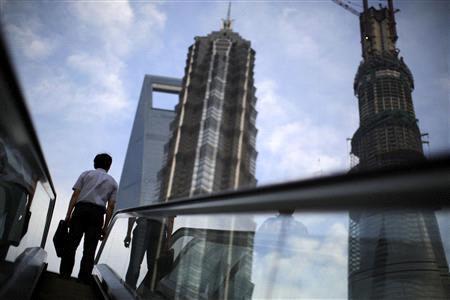Ammon News - HONG KONG (Reuters) - Seventy percent of analysts covering Chinese financial stocks rate them a buy, the highest among the world's top 10 markets for such shares. Yet its financials are the worst performing this year in the group, Thomson Reuters StarMine data shows.
That disconnect has been on display in recent weeks, with Chinese financial stocks getting hammered on fears about a credit crunch and the country's slowing economy. While the majority of analysts remain positive, mutual funds have dumped shares and short sellers have moved in.
"The sell-side, as is typical, has their blinders on," said Thomas Monaco, a managing director at independent research firm Forensic Asia. He compared China's financial industry to the Titanic. "It has hit the iceberg," said Monaco.
Critics such as fund managers have long said research analysts were too soft on companies.
Analysts worldwide face pressure from investment banking colleagues to go easy on a stock in case that company wants to use the bank for an initial public offering, a merger or a debt deal. Analysts are also reluctant to cut access to a company they cover, something a sell rating can do.
Experts said the recommendation gap for China was wide for other reasons.
One is that big Chinese firms tend to be connected to the ruling Communist Party, and few analysts want to put their institution into an awkward position with the government.
Another reason, cited by industry insiders, is that China's banks and insurers might raise money in the next year to recapitalize, and no bank wants to miss out on what could be huge offerings and big fees.
"Sell-side research is inherently conflicted by nature," said Edward Stockreisser, chairman of the Asian Association of Independent Research Providers.
TRUTH VS HYPE
None of the 37 financial stocks that are part of the MSCI China Index is rated a consensus sell, the Thomson Reuters data shows. Across the nine other major markets for financial shares, analysts have a buy rating on 47 percent of stocks.
"Analysts are positive on China financials partly because valuations are low," said May Yan, a bank analyst at Barclays. "There are a lot of fundamental challenges ... but there are trading opportunities from time to time."
Barclays has an overweight rating on five Chinese banks, and is neutral and underweight for two banks each.
The IBES MSCI China Financial Sector Index trades at 1.1 times book value, 55 percent below its 10-year median. Most Chinese banks are trading at or below book value even as they are generating a return on equity of near 20 percent, indicating the market is anticipating some bad news.
Indeed, short sellers are piling in. For example, 71 percent of the shares in mid-sized lender China Minsheng Banking Corp (600016.SS) that can be borrowed were out on loan on July 17, data from Markit, a financial data provider, shows.
ROCKY ROAD AHEAD
The Hang Seng H Financial Index .HSHFI is down 26.6 percent from its 2013 peak after a government crackdown on risky lending by banks triggered an unprecedented credit crunch last month, roiling China's markets.
The index has lost 46.6 percent since its pre-2008 crisis heights, partly on fears about bad debts in the sector due to the massive lending that helped China avoid the worst of the global financial fallout at the time. Since then, only four stocks that are part of the MSCI China index has attracted a consensus sell rating.
And the outlook is not good either. Chinese Premier Li Keqiang has pushed for economic reform over fast-line growth, raising the risk of a surge in bad loans for banks.
China's annual GDP growth slowed to 7.5 percent in April to June - the ninth quarter in the last 10 that expansion has weakened.
Consensus analysts' forecasts for China have been revised down consistently, but the banks have been revised up, said Andrew Swan, head of Asian equity for the world's biggest money manager, BlackRock.
"Going forward that looks like it has to change," he said.
A Reuters poll of Chinese funds in June showed portfolio managers were planning to invest 13 percent of their fund assets in financial stocks over the next three months, down from 20.1 percent in December.
As China's economy continues to slow, the market is once again likely to expose misplaced optimism.
"The market rarely misprices asset classes," said James Antos, a banking sector analyst at Mizuho Securities Asia Ltd. "The sell side is wrong on the Chinese banks."
Antos rates only half of the stocks he covers as a buy.
CONFLICT OF INTEREST
Yet the pressure to avoid being overly negative remains heavy.
Two industry experts said "hold" ratings in China often become "sell" recommendations in private conversations with clients.
"What's written and what's said are different things a lot of times," said one of the experts, a former fund manager who declined to be identified because he did not want to upset his contacts on the sell side.
There is mounting pressure on broking firms themselves as trading volumes fall and competition mounts.
They also do not want to miss out on potential investment fees should Chinese banks recapitalize under pressure from mounting bad loans or other hits to the business.
"Do you think you will do any business if you are strongly saying sell on ICBC, just to pick a name?" said Rajiv Jain, who manages $41 billion at Vontobel Asset Management and is shunning China banks. He was referring to Industrial and Commercial Bank of China (601398.SS), the world's biggest bank by market value.
Asia's investment industry is also largely dominated by long only funds that do not short shares like a hedge fund.
That makes a sell rating less profitable for a broking firm. Being neutral is also not favored as it doesn't result in trading to help a broking firm earn a commission.
"There's so much pressure on the sell side analysts to have buy recommendations," said Mizuho's Antos.
